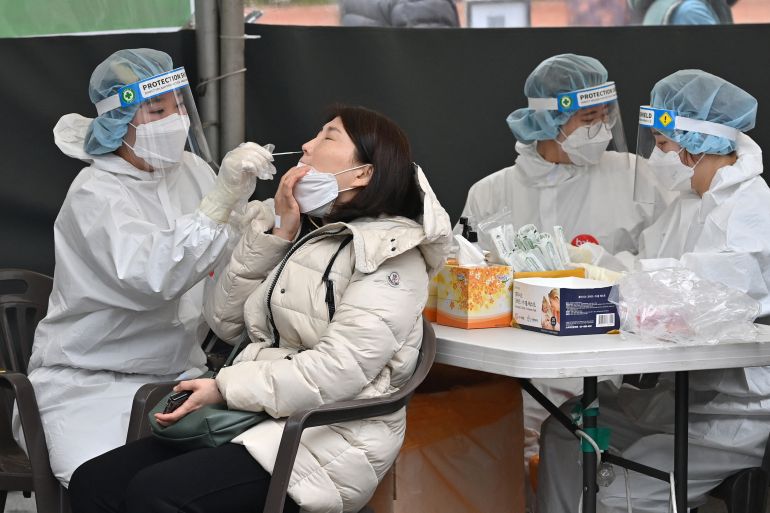COVID: S Korea reports record cases as Omicron wave nears peak
Country long hailed as a pandemic success story reports more than 621,000 cases and 429 deaths.

South Korea has reported new daily records for coronavirus cases and deaths as the Omicron variant continues to spread rapidly across the country.
The Korea Disease Control and Prevention Agency (KDCA) reported a staggering 621,328 new COVID-19 infections on Thursday, including 62 among arrivals from overseas, according to the Yonhap news agency.
Keep reading
list of 4 itemsConservative outsider elected as S Korea’s next president
In rare stand, South Korea, Singapore unveil sanctions on Russia
South Korea extends business curfew as COVID-19 cases top 100,000
Deaths also reached a record for a single day with 429 people confirmed to have lost their lives, bringing the overall toll since the start of the pandemic to 11,481.
The surging caseload comes as South Korea eases curbs designed to contain the spread of the virus, amid pressure from small businesses and others hit hard by the pandemic.
The government is due to announce on Friday whether it will further relax restrictions, which currently include a late-night business curfew and a ban on private gatherings of more than six people.
Yonhap noted that the number of critically-ill patients, which is being used to guide the official pandemic response, had dropped to 1,159 from 1,244 on Wednesday.
The country has scaled back the test, track, tracing, and quarantine strategy that helped keep earlier waves in check and despite Thursday’s record deaths, the country’s fatality rate of 0.14 percent remains low relative to other countries.
Health authorities also believe the Omicron wave could be close to its peak although the number of daily cases is far in excess of earlier predictions.
About 87 percent of South Korea’s 52 million people have been fully vaccinated with 63 percent having received a booster shot, according to the KDCA.
A government analysis of some 141,000 Omicron cases reported in the country over the past year showed that there were no deaths among people under 60 who had received a booster shot, Son Young-rae, a health ministry official, said on Wednesday, adding that the disease could be treated like the seasonal flu.
“We see this could be the last major crisis in our COVID responses, and if we overcome this crisis, it would bring us nearer to normal lives,” Son told a briefing.
A survey released earlier this week by Seoul National University’s graduate school of public health, showed the number of South Koreans who worry about a serious health impact from COVID-19 had dropped to about 48 percent, the lowest since the surveys began in January 2020.
At the same time, those who think they are likely to contract the virus was at its highest.
“People’s awareness about the virus’ danger has clearly changed,” said professor Yoo Myung-soon who led the study.
“Despite the Omicron variant’s much higher infectivity than Delta, its relatively low fatality appears to have alleviated people’s concerns.”